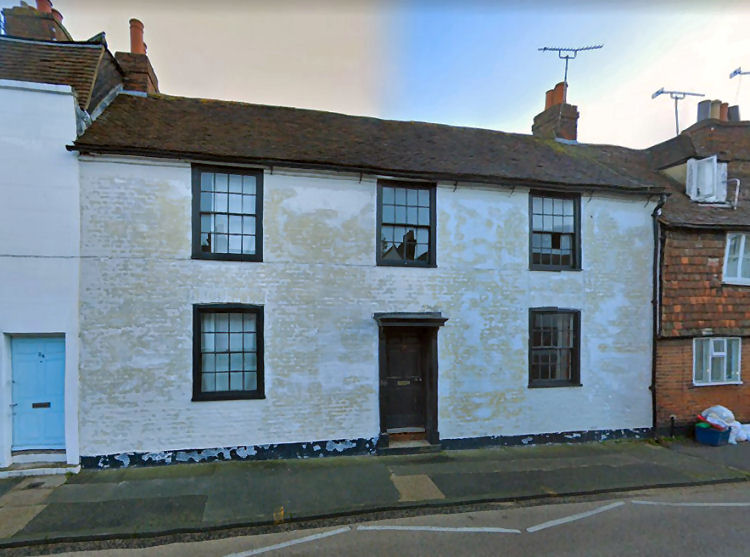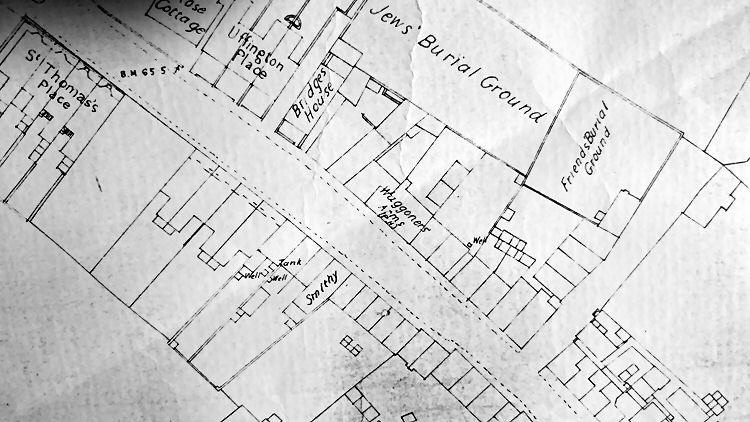|
Whitstable Road
St Dunstan's
Canterbury

Above Google image December 2020. I am informed that the building is
situated at number 22 today. |

Above map 1874 identified by Rory Kehoe. |
Only traced from between 1843 and 1874 and also without a definitive
address it's hard to trace this establishment any further than I have at
present. However, as a loose pointer the 1880 Kelly's directory does
mention a Coach and Carriage Builders situated at numbers 9 and 10. Could
this just be a co-incidence?
Further research from Rory Kehoe tells me It is shown/named on the 24"/1mile
1874 OS map of Canterbury. It appears to be 7 properties up from the corner
of Whitstable Road/Forty Acres Road (assuming those there in 1874 are the
same as now) which make the building behind the bins.
|
From the Kentish Gazette, 21 November 1843.
DEATH.
Nov. 11, in St. Dunstan's, Canterbury, at an advanced age, Mr. Rogers,
landlord of the "Wagoner’s Arms."
|
|
From the Kentish Gazette, 9 September 1845.
Canterbury.
At the annual licensing on Thursday, the city magistrates renewed one
hundred and nineteen licences.
Nine new applicants were granted us
follows:— Thomas Attwood, "Old City of Canterbury," Oatenhill; Charles
Denham, for the "Queen's Head," Northgate; Henry Clements, for the "Alto
Douro," St. George’s-place; Eliz. Clinch. "Plasterers' Arms," Northgate;
Joseph Harrison, "Royal George," Northgate; Joseph Hirst, "Dragoon,"
Military-road; Angel Hyde, "Military Tavern," King-street; George
Lilley, "Waggoners' Arms," St. Dunstan; Henry James Page, "Windsor
Castle," Bridge-street.
|
|
Kent Herald, 11 September 1845.
At the annual licensing on Tuesday, our city magistrates renewed 119 licenses.
The application for five others neglected to attend, and another, Miss Duncan
applied to change the sign of her house from the "Globe" to the "Victoria" -
which was postponed to the 8thth inst., as also was an application of Mr. Delasaux's, on the part of Messrs. Flint, brewer, to withhold the license for
the "King's Head," in Northgate.
Nine new applications were granted as follows:-
Thomas Atwood, "Old City of Canterbury," Oakenhill;
Charles Benham, for the "Queen's Head," Northgate;
Henry Clements, for the "Alto Douro," St. George's-place;
Elizabeth Clinch, "Plasterers' Arms," Northgate;
Joseph Harrison, "Royal George," Northgate;
Joseph Hurst, "Dragoon," Military-road;
Angel Hyde, "Military Tavern," King Street;
George Lilly, "Waggoners Arms," St. Dunstan;
Henry James Page, "Windsor Castle," Bridge-street.
Two others were adjourned until the 18th., Charles Aiano's, of the "Good
Intent," Artillery-street, who was opposed by Mr. Dunk, of the "Providence;" and
William Stones, "Royal Standard," New Ruttington-lane, who was unable to attend
through illness.
|
|
From the Kentish Gazette, 29 December 1857.
Yesterday.
(Before the Mayor, Alderman Plummer, W. Brock, Esq., and T. S.
Cooper, Esq.)
George Lilley, of the "Waggoner’s Arms," St. Dunstan’s, appeared on
an information for selling beer on Christmas morning.
It appeared that the house was generally well conducted and that the
defendant was not aware of the law which requires public-houses to
be closed on Christmas-day at the same hours as on Sunday.
Under these circumstances the Bench dismissed the information.
|
|
From the Kentish Chronicle, 26 May, 1860.
CANTERBURY POLICE COURT. Monday.
(Before the Mayor, Alderman Masters, and T. Philpott, Esq).
Edward Keen, labourer, Harbledown, was charged with creating a
disturbance at the "Waggoner's Arms" public-house, and with assaulting
John Cashman, a private in the 90th Regiment. The complainant stated
that he and a companion were at the "Waggoner's Arms" between ten and
eleven o'clock on Saturday night. The prisoner was singing a song and
after he had done, complainant sang a song also. The defendant called
him an Irish blackguard and some words ensued. The complainant and his
companion left and were going to the barracks when they were followed by
the defendant and some other men. The defendant came behind and knocked
him down. Complainant was taking off his belt and preparing to fight
again when the police came up and took them away.
A boy named Terry, who
resides at St. Dunstan’s, deposed that he saw the whole of the
disturbance. The soldiers came out of the "Waggoners Arms," and were
going quietly home when they were attacked by the defendant and his
brother. The brother knocked the complainant down first, and afterwards
the defendant followed up the attack by knocking him down a second time.
The brothers then attacked him together, and the soldier was knocked
down before he
retaliated. Other witnesses were called but their evidence was not of a
material character. The complainant’s face was much disfigured, as was
also the face of a witness who was accidentally struck during the
disturbance. The Bench found the assault proved and fined the defendant
5s. and 8s. expenses.
|
|
From the Kentish Chronicle, 30 July, 1864.
FATAL ACCIDENT.
One evening last week an accident, which resulted fatally, occurred on
the Whitstable Road, St, Dunstan's. A man named James Parker, who
resided in the parish of Blean, was returning home in charge of a tug
drawn by one horse. He appeared to have been riding on the fore part of
the tug, and on passing the houses at the foot of St. Thomas's Hill, the
horse started off at a rapid pace. The unfortunate man, who was the
worse for liquor at the time, fell off the tug in front of the wheels,
which passed over his cheat. Assistance was speedily rendered, and the
man was taken into the house of Mr. Maple, the “Waggoner's Arms.” Mr. A.
B. Andrews, surgeon, was sent for, but was unable from a cursory
examination to ascertain the nature of the man's injuries, which,
however, appeared to be serious. He was removed home the same evening,
and was attended subsequently by Mr. Williams. After lingering till
Saturday morning he died.
|
|
From the Whitstable Times, 26 November, 1870.
PUBLIC HOUSE OFFENCE.
James Culver was summoned for keeping his house open for the sale of
liquor after prohibited hours, on the night of Sunday, the 13th inst.
P.C. Mantle said the defendant kept the “Waggoners' Arms,” St. Dunstan’s,
and on the night of the 13th, at about forty-five minutes past eleven,
he went into the house, and saw several men drinking beer. The defence
was that the men would not leave the house when requested to do so. The
beer was drawn before eleven o'clock.
Case dismissed.
|
LICENSEE LIST
ROGERS Mr to 11/Nov/1843 dec'd
LILLEY George Sept/1845-58+
 
HOBBS Mrs E 1862+

MAPLE S Mr 1864-67+

CULVER James 1870+
https://pubwiki.co.uk/WaggonersArms.shtml
 From Bagshaw Directory 1847 From Bagshaw Directory 1847
 From Melville's Directory 1858 From Melville's Directory 1858
 From the Post Office Directory 1862 From the Post Office Directory 1862
 Kentish
Chronicle Kentish
Chronicle
|

